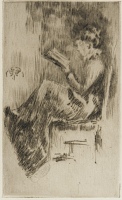Reading a Book | ||
| Number: | 112 | |
| Date: | 1873/1874 | |
| Medium: | drypoint | |
| Size: | 127 x 77 mm | |
| Signed: | butterfly at left | |
| Inscribed: | no | |
| Set/Publication: | 'Cancelled Plates', 1879 | |
| No. of States: | 2 | |
| Known impressions: | 18 | |
| Catalogues: | K.111; M.110; W.97 | |
| Impressions taken from this plate (18) | ||
TECHNIQUE
This is a drypoint, drawn mostly with large, slightly irregular patches of long diagonal or vertical shading - and the few proofs were printed with rich burr.
PRINTING
A rare drypoint, of which only three impressions before cancellation have been recorded. The first state was printed in black ink on a sheet of ivory laid paper removed from a book, with a partial Arms of Amsterdam watermark ( ). The second state, also printed in black ink, was printed with strong burr, just like the first state (
). The second state, also printed in black ink, was printed with strong burr, just like the first state ( ). The third, where the drypoint still prints with a burr, also appears to be in black ink, and it was trimmed to the platemark and signed on the tab with Whistler's butterfly and 'imp.' about 1886/1887, presumably when it was sold by Whistler or returned to him for a signature.
). The third, where the drypoint still prints with a burr, also appears to be in black ink, and it was trimmed to the platemark and signed on the tab with Whistler's butterfly and 'imp.' about 1886/1887, presumably when it was sold by Whistler or returned to him for a signature.
 ). The second state, also printed in black ink, was printed with strong burr, just like the first state (
). The second state, also printed in black ink, was printed with strong burr, just like the first state ( ). The third, where the drypoint still prints with a burr, also appears to be in black ink, and it was trimmed to the platemark and signed on the tab with Whistler's butterfly and 'imp.' about 1886/1887, presumably when it was sold by Whistler or returned to him for a signature.
). The third, where the drypoint still prints with a burr, also appears to be in black ink, and it was trimmed to the platemark and signed on the tab with Whistler's butterfly and 'imp.' about 1886/1887, presumably when it was sold by Whistler or returned to him for a signature. The drypoint was published in an album of Cancelled Plates ('Cancelled Set') by The Fine Art Society, London, 1879. Most impressions are from the rubbed down and cancelled plate. One is in black ink on cream wove paper ( ) but most were printed in black on cream or ivory laid paper. One is on a 'modern' (post-1800) cream laid paper with a horned crown watermark (
) but most were printed in black on cream or ivory laid paper. One is on a 'modern' (post-1800) cream laid paper with a horned crown watermark ( ). Rosalind Birnie Philip (1873-1958) acquired two cancelled impressions, both on ivory laid paper (
). Rosalind Birnie Philip (1873-1958) acquired two cancelled impressions, both on ivory laid paper ( ,
,  ), the latter being stuck on the envelope containing the copper plate, which has not improved its condition.
), the latter being stuck on the envelope containing the copper plate, which has not improved its condition.
 ) but most were printed in black on cream or ivory laid paper. One is on a 'modern' (post-1800) cream laid paper with a horned crown watermark (
) but most were printed in black on cream or ivory laid paper. One is on a 'modern' (post-1800) cream laid paper with a horned crown watermark ( ). Rosalind Birnie Philip (1873-1958) acquired two cancelled impressions, both on ivory laid paper (
). Rosalind Birnie Philip (1873-1958) acquired two cancelled impressions, both on ivory laid paper ( ,
,  ), the latter being stuck on the envelope containing the copper plate, which has not improved its condition.
), the latter being stuck on the envelope containing the copper plate, which has not improved its condition.
